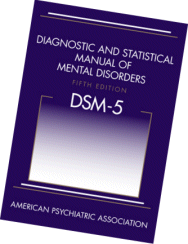 Demonstrating that the folks who are revising the Diagnostic and Statistical Manual of Mental Disorders (DSM-5) are listening to the scientific data, they have nixed two new proposed diagnoses — anxiety-depressive syndrome and attenuated psychosis syndrome. The changes were announced this week at the annual meeting of the American Psychiatric Association, the organization largely responsible for updating the reference manual used by health and mental health professionals to make diagnoses.
Demonstrating that the folks who are revising the Diagnostic and Statistical Manual of Mental Disorders (DSM-5) are listening to the scientific data, they have nixed two new proposed diagnoses — anxiety-depressive syndrome and attenuated psychosis syndrome. The changes were announced this week at the annual meeting of the American Psychiatric Association, the organization largely responsible for updating the reference manual used by health and mental health professionals to make diagnoses.
The critics were worried that these new diagnoses would label millions of Americans with a mental disorder — and offering them subsequent treatment — that today wouldn’t qualify for such diagnosis or treatment.
For instance, while anxiety mixed with depression is actually quite commonly seen in the wild of clinical practices, there is no specific diagnosis for this mixed mood state. The DSM-5 sought to correct this problem — that clinicians are treating millions for a problem the DSM says doesn’t technically exist. But critics worried the new criteria were too lax and might result in over-diagnosis.
The same was true for attenuated psychosis syndrome. The proposed diagnosis was an effort to get children and young adults into treatment sooner for experiencing weird thoughts or hallucinations. But people worried that it would lead to unnecessary treatment of kids for a potentially temporary problem.
The DSM folks responsible for these changes emphasized that they were the result of scientific data — not just people’s subjective opinions:
Dr. David J. Kupfer, a professor of psychiatry at the University of Pittsburgh and the chairman of the task force making revisions, said the changes came in response mainly to field trials — real-world studies testing whether newly proposed diagnoses are reliable from one psychiatrist to the next — and also public commentary. “Our intent for disorders that require more evidence is that they be studied further, and that people work with the criteria” and refine them, Dr. Kupfer said.
Allen Frances, resident curmudgeon and the editor of the DSM-IV — the prior revision of the DSM that caused a lot of the over-diagnosis of disorders we see today — was jubilant, “At long last, DSM 5 is correcting itself and has rejected its worst proposals.”
Really? Was there really any doubt that as the data came in from the field trials, the DSM-5 — which is under active draft revisions and has yet to be published — would also be updated? Of course there wasn’t, yet critics like Frances raised the straw man argument and constantly suggested the DSM’s new criteria were already set in stone.
Autism Disorders Will Continue to Undergo Reorganization
One set of disorders that will continue to undergo their proposed reorganization are autism spectrum disorders, according to the NY Times. The current mishmash of diagnoses simply aren’t very well organized or well thought-out:
The proposed definition of autism, which would eliminate related labels like Asperger’s syndrome and “pervasive developmental disorder,” came under fire in January, when researchers at Yale University presented evidence that about half of the people who currently have a diagnosis on the higher functioning end of the “autism spectrum” would no longer qualify under the new definition.
At this week’s annual meeting, researchers presented data from an unpublished study of some 300 children, finding that the proposed definition would exclude very few who currently have a diagnosis of autism or a related disorder.
And last, the DSM committee will try and ensure clinicians and physicians don’t misdiagnose grief as depression, with a prominent note stating that, in most cases, normal grief does not qualify for a major depression diagnosis. However, since the note won’t take place of the actual diagnostic criteria, professionals will still be able to give people experiencing a severe grief reaction a diagnosis of depression — allowing them to access needed treatment to help them with their depressive feelings.
All of this is good news and demonstrates that the DSM process is working according largely to scientific data, not loud-mouthed “experts” who believe their subjective judgment should override the research.
Read the full article: D.S.M. Panel Backs Down on Diagnoses
2 comments
I am just standing up and applauding. Maybe there is hope for us yet. Thanks doc for this post.